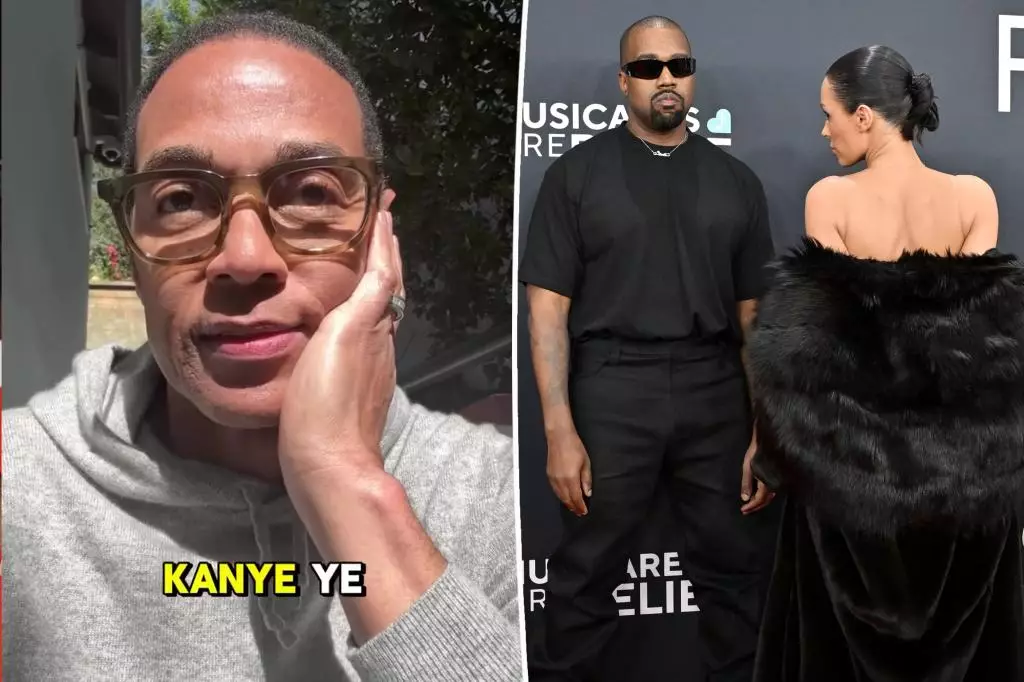In a recent clash between two prominent figures, CNN anchor Don Lemon confronted rapper Kanye West’s derogatory remark, demanding respect in light of the rapper’s label of “coon” towards him. This altercation vividly illustrates the volatility of celebrity interactions in the digital age, highlighting issues of respect, accountability, and the nuanced dynamics of black identity in America.
The controversy began when Don Lemon shared heard rumors on social media regarding Kanye West and his wife, Bianca Censori, supposedly being expelled from the Grammy Awards. While Lemon emphasized that he was merely passing along what he had heard—and did not witness the event first-hand—West took issue with Lemon’s portrayal, culminating in an explosive response on his own social media platform. This incident underscores the often precarious relationship between rumor, media, and celebrity reputations, especially when it comes to racially charged dialogue.
Lemon expressed his disappointment in Kanye, stressing the significance of the term “coon” within the black community. He implored West to consider the weight of such language, especially coming from another black man. This plea for mutual respect is relevant not only in their personal feud but also resonates with wider societal conversations about respect and accountability among public figures.
Kanye West, known for his outrageous antics and bold statements, did not hold back when he addressed the rumors. His pointed remark that Lemon is just another “goofball” who perpetuates negative narratives highlights his frustration with how the media presents black artists and figures. However, the word choice used by West, especially in the context of labeling another black man in such a derogatory manner, raises questions about intra-community respect and the ramifications of public insults.
Moreover, the sensational nature of West’s comment stems from his known history with media backlash, particularly after controversial stances earlier in his career, including support for former President Donald Trump. This history adds a layer of complexity, illustrating how the past can resurface in conflicts, prompting reactions that may not align with the intentions behind their original actions.
Lemon’s position as a media figure complicates this dispute further. As a seasoned journalist, he occupies a space where the line between reporting details and perpetuating narratives becomes blurred. His insistence that he was merely correcting a widely spread rumor draws attention to the responsibility of journalists in shaping public discourse, particularly in matters laden with racial implications. The clamorous nature of social media exacerbates these situations, allowing for rapid spread of misinformation and instant backlash, as seen in West’s immediate response.
Furthermore, Lemon’s acute observation about Kanye’s ability to market himself speaks volumes about the rapper’s profound impact on culture and media. While Kanye can manipulate public perception through provocative stunts—like his recent appearance at the Grammys—Lemon’s take indicates an understanding of the manipulative nature of celebrity publicity. This acknowledgment reflects a deeper understanding of media theory, suggesting that entertainers like West thrive on controversy to generate relevance.
As the tension between these two figures plays out in the public eye, the ramifications stretch beyond their personal feud. This altercation presents an opportunity for broader discussions on race, respect, and the responsibilities associated with celebrity status. How these high-profile individuals navigate conflict—from language to social media platforms—influences younger generations who often emulate them.
The disagreement between Don Lemon and Kanye West serves as a microcosm of broader issues concerning race, respect, and media dynamics in modern society. Their exchange highlights the complexities faced by public figures, urging them to cultivate awareness of their words and actions in a world where every conversation is amplified and dissected. As they both continue to command attention, the hope is that their interactions can inspire more constructive dialogues about the implications of respect within their communities.

